DO-IT Retrospective: 30 Years of Success!
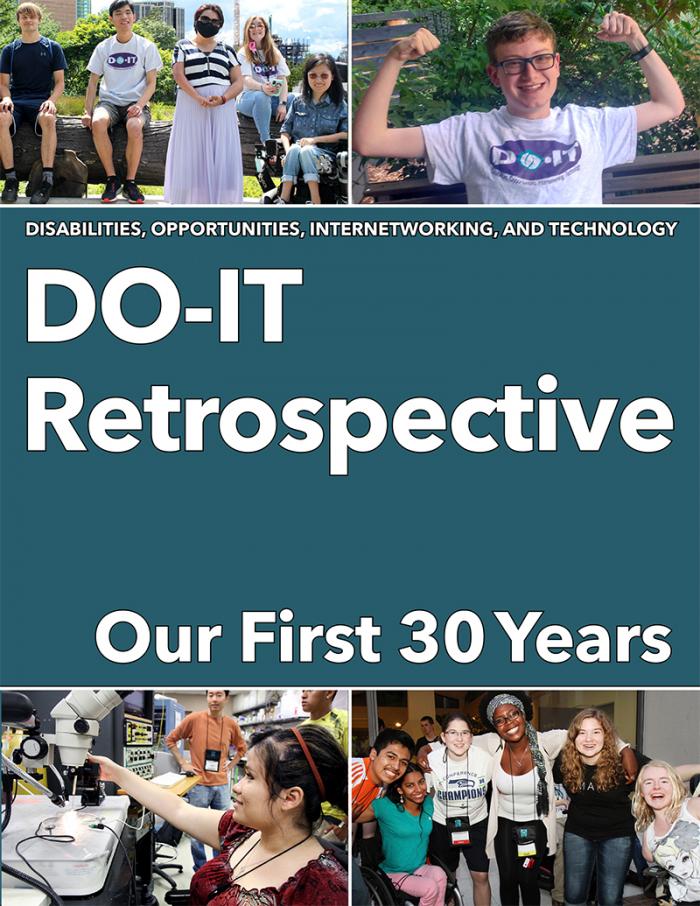
From the Director
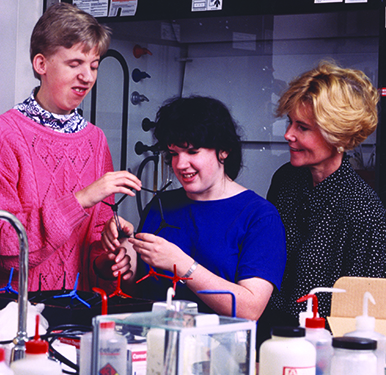
Have we really been “doing–it” for 30 years? Well, time flies when you’re having fun, and that makes sense when it comes to DO-IT (Disabilities, Opportunities, Internetworking, and Technology). In this publication we share DO-IT’s past, present, and plans for the future.
In our flagship program, DO-IT Scholars, 570 students with disabilities from over 250 high schools in Washington have learned to use technology to maximize their independence and productivity, networked with successful people who have disabilities, and engaged in activities that help them prepare for challenging college studies and careers. Pictured here are Scholars from our very first year and a current Scholar, respectively. It is exhilarating to witness our students reach personal milestones, continue to participate in DO-IT as mentors to incoming students, speak in classes and at conferences, and become leaders in their fields. The successful practices of the DO-IT Scholars program have been replicated to benefit thousands of youth with disabilities through other projects and collaborative efforts, including those in Japan, Malaysia, and Singapore.
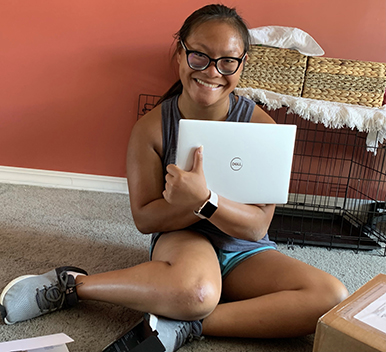
DO-IT works with everyone who can contribute to the success of people with disabilities in challenging academic programs and careers: Disability service providers, employers, educators, parents, governmental agencies, and high-tech companies. Organizations and activities are summarized in the Student-Centered Community Building Model. Through our many programs, presentations, capacity building institutes, online classes, and conferences, DO-IT and its partners help people work more effectively with individuals with disabilities. We share successful practices around the world through a variety of resources, communities, and collaborations.
This is an exciting time as we witness more people with disabilities realizing their potential and more organizations recognizing the benefits of a diverse workforce that fully includes people with disabilities. Yet, there are so many challenges ahead. We will continue our successful partnerships and create new ones to address critical needs in our society. We invite you to share your talents and resources to extend our reach.
Sheryl Burgstahler, Ph.D.
Director, DO-IT Center and Accessible Technology Services
Affiliate Professor, College of Education
University of Washington
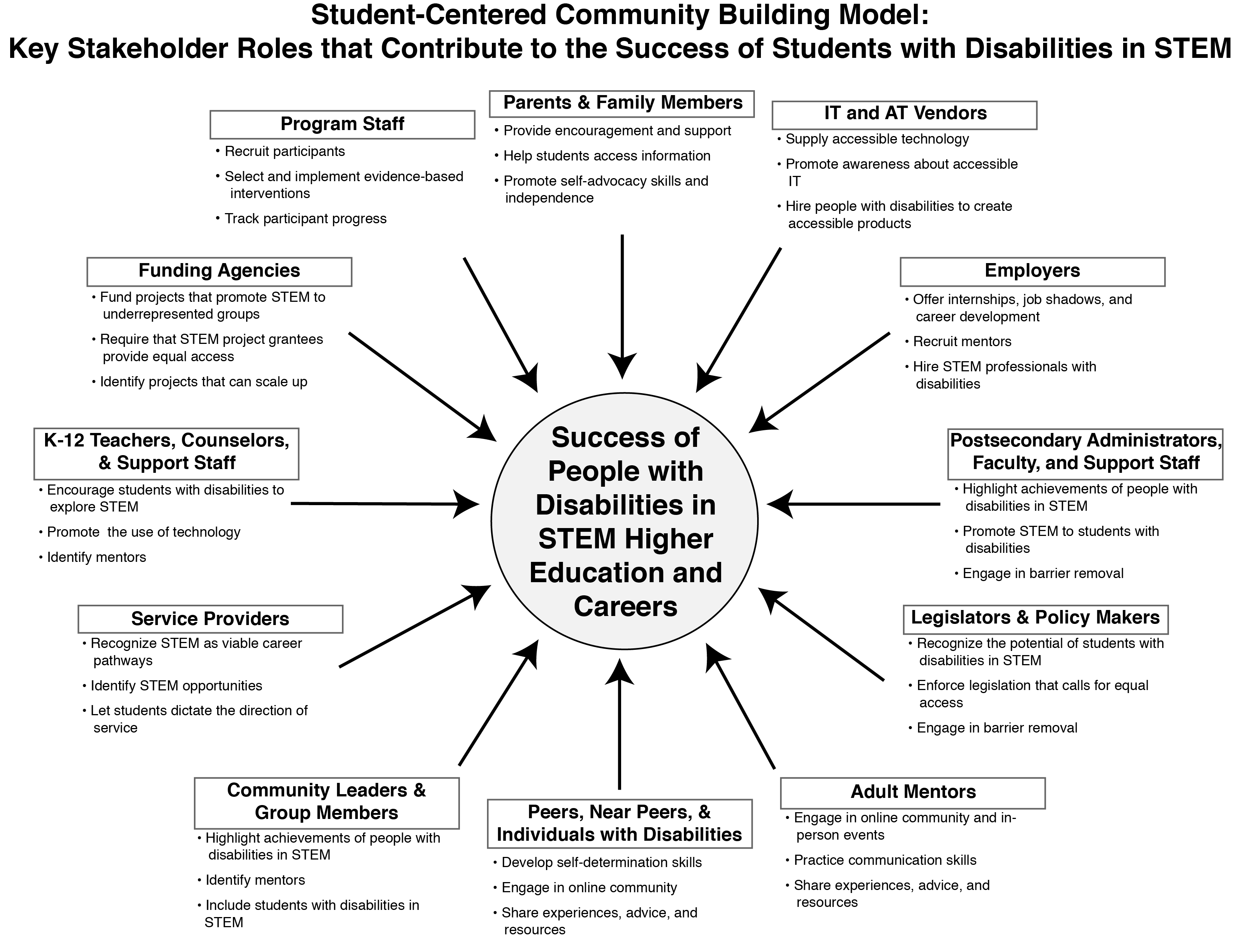
DO-IT History
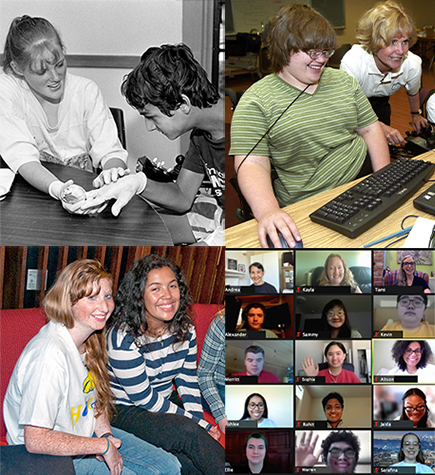
In October 1992, Sheryl Burgstahler envisioned a world where all people with disabilities could reach their full potential and contribute their unique perspectives and talents to society. She requested a grant from the National Science Foundation (NSF) with the goal of increasing the representation of individuals with disabilities in science, technology, engineering and mathematics (STEM) academic programs and careers.
NSF continues to fund numerous activities that include summer programs and online communities for students with disabilities and disability training for educators, employers, service providers, and other stakeholders. The U.S. Department of Education has funded training for postsecondary faculty, service directors, and technology specialists to employ universal design strategies to make their offerings more inclusive. The Department of Labor, Microsoft, Boeing, Washington State, and private donations have also provided funding.
The recent COVID-19 pandemic has provided an opportunity to rethink our programming, delivery of services, and community-driven needs assessments. Out of necessity, we moved many of our face-to-face activities online. We’ve also helped increase the accessibility of online learning environments and made efforts to improve the accessibility of videoconference tools and technology.
The collection of all of these projects is what we call “DO-IT.” We currently manage a large number of programs— each with unique objectives, budgets, activities, and timelines that ultimately reward us with the success of thousands of people with disabilities.
DO-IT Programs
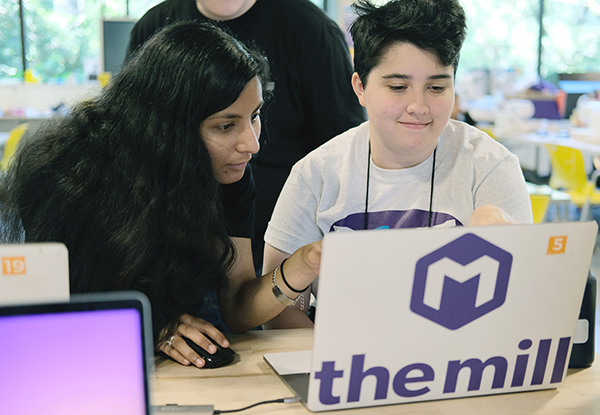
DO-IT has undertaken dozens of specific programs. Current endeavors, including those summarized below, are described online.
DO-IT Scholars
The DO-IT Scholars program has engaged almost 600 high school students with disabilities in pursuing college and careers and developing leadership skills. Participants are encouraged and supported by project staff, as well as successful students and professionals with disabilities, as they engage in internships and other work-based learning activities, residential summer programs, conferences, and online forums.
AccessComputing
Partnering with stakeholders nationwide, AccessComputing helps students with disabilities successfully pursue degrees and careers in computing fields and increases the capacity of institutions and companies to fully include people with disabilities in computing courses and careers, thus improving these fields with the expertise and perspective of this underrepresented group.
Neuroscience for Neurodiverse Learners
Neuroscience for Neurodiverse Learners (NNL) provides hands-on experiences in neuroscience disciplines, networking opportunities, and resources to high school and first-year college students identified as neurodiverse learners. NNL is an NSF-funded Innovative Technology Experiences for Students and Teachers (ITEST) project.
AccessADVANCE
AccessADVANCE aims to increase the participation and advancement of individuals who identify as women with disabilities in academic science, technology, engineering, and math (STEM) careers.
AccessINCLUDES
The AccessINCLUDES Initiative includes multiple projects, funded by the National Science Foundation (NSF), that promote the inclusion of people with disabilities in STEM through nationwide collaborations.
AccessISL
AccessISL supports efforts to make informal STEM learning (ISL) welcoming and accessible to everyone. ISL refers to learning about STEM outside of a traditional classroom setting, in places such as museums, science centers, and summer camps.
30 Years at a Glance
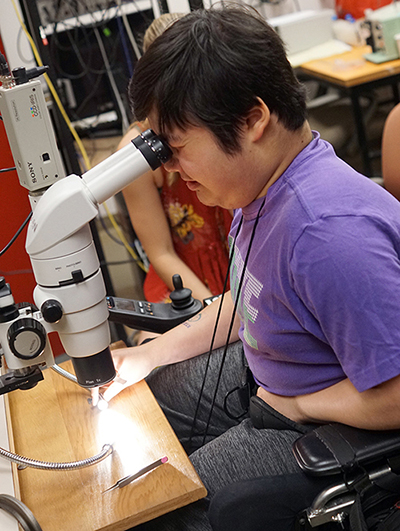
| 2000+ students actively involved in projects and engaging with mentors |
95% DO-IT Scholars have attended college |
25+ programs and initiatives that empower people with disabilities |
|
1000+ research and industry internships completed by participants |
50 states with participants, mentors, and/or collaborators |
65 summer camps hosted at University of Washington (39), Camp Courage (15), and other campuses (11) |
|
40 national capacity building institutes for over 700 stakeholders |
115+ minigrants awarded to other institutions |
60+ electronic communities promoting equal access |
|
90+ training and advocacy videos produced |
850+ articles in the online Knowledge Base |
$50m+ grant funding received to support DO-IT’s mission |
Critical Junctures for STEM Students with Disabilities
DO-IT interventions sponsored by NSF are organized into a model of inputs to promote movement through critical junctures to bring students with disabilities into STEM fields.
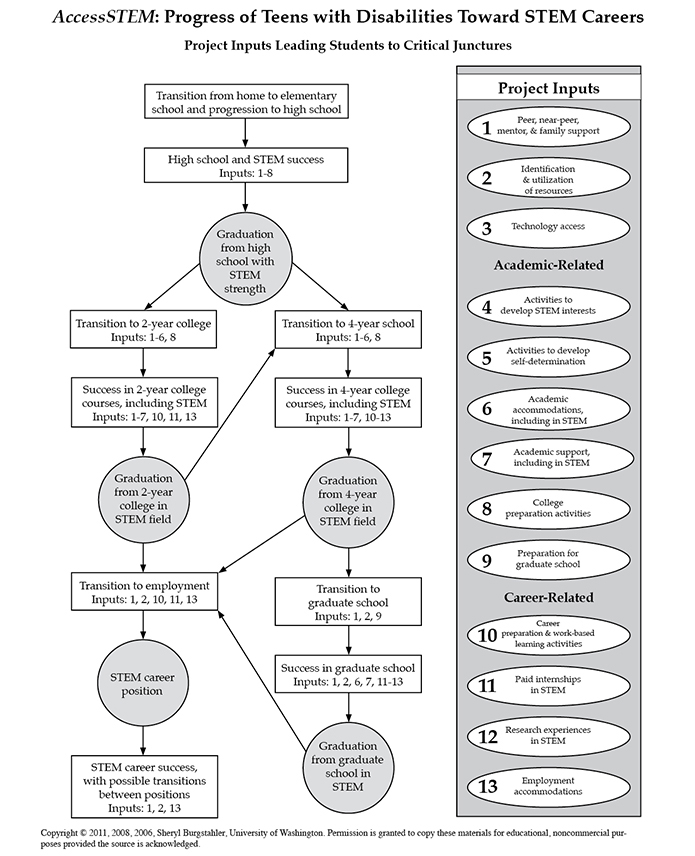
Awards

The DO-IT Center, its staff, and its participants have been featured in numerous articles in newspapers, journals, and magazines. Staff, mentors, and collaborators have received many local, regional, and national awards. A few are described below.
2021 NAPE Diversity in Technology Leadership Award
Presented to DO-IT Director Sheryl Burgstahler for being a role model to the national community of excellence in technology and/or STEM.
2017 Induction into the Susan M. Daniels Disability Mentoring Hall of Fame
DO-IT was inducted for its comprehensive mentoring program and its position as the longest standing online mentoring community for individuals with disabilities in the world.
2012 Strache Leadership Award
Sheryl Burgstahler was honored for her leadership in working with students as an educator and mentor and empowering people with disabilities with technology.
2007 Career Opportunities for Students with Disabilities Greenberg Award for Innovation
Presented to Sheryl Burgstahler, it recognized innovative efforts in securing employment opportunities for students with disabilities.
2007 American Society of Engineering Education Best Zone Paper Award
Richard Ladner and Sheryl Burgstahler, co-directors of AccessComputing, and Tammy VanDeGrift and Annamarie Poginy were recognized for their manuscript, The Game of Life Workshop - Reaching Out to High School Students with Disabilities.
2006 Trace Research and Development Center Catalyst Award
The Trace Research and Development Center recognized Sheryl Burgstahler for extraordinary accomplishments in motivating stakeholders to promote the success of people with disabilities.
2002 Washington Association for Postsecondary Education and Disabilities (WAPED) Achievement Award
WAPED recognized the exemplary work of DO‑IT in helping students with disabilities achieve success in postsecondary education.
2000 Golden Apple Award
DO-IT’s contributions to excellence in precollege education in Washington State were recognized.
1999 Best of the Northwest Film Video Festival Award of Excellence - Informational Category
The producer of DO-IT videos, Charlie Hinckley, was recognized for The Winning Equation - Access + Attitude = Success.
1997 The President’s Award of Excellence in Mentoring
President Clinton recognized DO-IT’s success in mentoring students with disabilities in STEM.
1995 The National Information Infrastructure Award in Education
Recognition was given to DO-IT for the its creative use of the Internet with individuals with disabilities.
1995 Washington Association for Postsecondary Education and Disabilities (WAPED) Organization Award
Presented to DO-IT for an outstanding record of service to people with disabilities.
More information about awards presented to DO-IT, its staff, and participants can be found at www.uw.edu/doit/about/awards.
DO-IT Success Stories
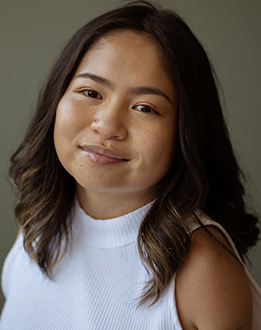
Teresa, DO-IT Ambassador
Teresa recently earned a bachelor of science in psychology from Seattle University and plans on pursuing a master of social work at Columbia University. She works to make a difference for people both locally and nationally, through leadership positions both on and off campus, and through her goals to work with underprivileged incarcerated youth. Her goals are rooted in empowering others and continuing advocacy work for the disabled community. Teresa said “DO-IT prepared me to recognize what living in an able-bodied world looks like. They specifically taught us how to advocate, navigate, and be a change maker in a greater effort to destigmatize the world around us. The most important thing I took away from the program is the strength I gained in embracing my identity as a disabled woman. DO-IT is a program that serves to empower each person to embrace the beauty within their own disabilities while also amplifying the need for voices like ours to create a more just and humane world.”
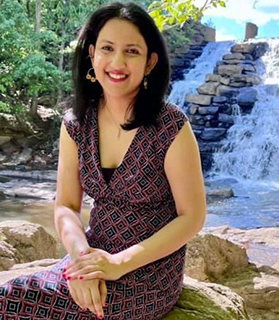
Meenakshi, AccessComputing
Meenakshi is a software engineer at Microsoft and a recent graduate of Auburn University with a master’s degree in computer science. She has been an active member of AccessComputing for several years, coordinating panels featuring students with disabilities at conferences, participating in conversations in our mentoring community, and attending a capacity building institute. In 2017, Meenakshi was awarded a minigrant to facilitate a one-day workshop for students who are visually impaired along with AccessComputing partner, Dr. Sarah Lee. Meenakshi has engaged in many activities that benefit the disability community, such as running a Facebook support group for working professionals with disabilities, Working With Disabilities. This group provides a space to discuss ableism, accessibility, and share useful resources with each other. Meenakshi said, “AccessComputing helped me realize my passion for accessibility which is an important part of the work I do today. Without their support, I wouldn’t have had a successful college career.”
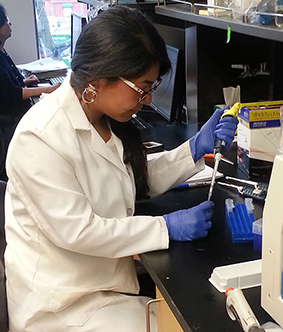
Erica, DO-IT Ambassador
Erica is a fifth-year doctoral student in the Department of Health Systems and Population Health at the University of Washington (UW) School of Public Health studying occupational health services. She completed a second year in her internship with the American Evaluation Association Graduate Education Diversity Internship (GEDI) with Michigan Public Health Institute practicing a culturally responsive and racial equity lens in evaluation and research, and she recently worked with the Health Promotion Research Center, evaluating how evidence-based programs for older adults transitioned from in-person to remote during the COVID-19 pandemic. Her dissertation focuses on how labor laws and policies impact agricultural worker health. Erica said “As a young Latina, growing up in rural Pateros, WA, I never thought I would do half of the things that I have done already. There have definitely been times when I remind myself to not only accept myself with my disability, but to love myself and the stronger person I have become because of it. When I look back at who I was, all of these programs and experiences has made me a more confident, accomplished, and educated woman.”
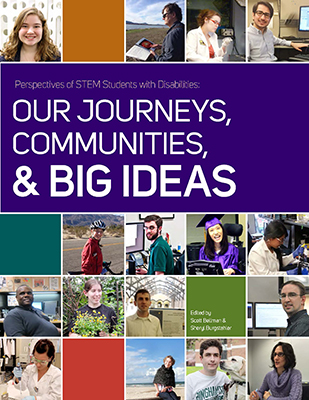
Our Participants
Hundreds of DO-IT participants have achieved amazing goals. Participants are earning degrees in a wide variety of interesting and competitive fields, then gaining employment in challenging and world-changing careers.
To learn more about the journeys of DO‑IT participants, consult the resources below.
Perspectives of STEM Students with Disabilities: Our Journeys, Communities, and Big Ideas
A Bold Vision and Looking Forward
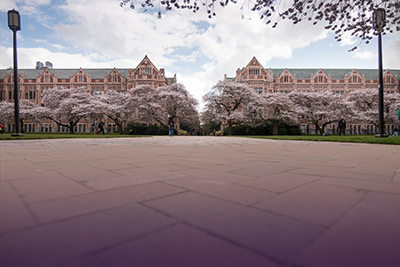
A Bold Vision
The DO-IT Center empowers people with disabilities through technology, education, self-determination and leadership training, and mentor support. It promotes awareness and accessibility—in both the classroom and the workplace—to maximize the potential of individuals with disabilities and make our communities more vibrant, diverse, and inclusive.
The DO-IT Center strives to
- increase the success of people with disabilities in challenging academic programs and careers, including those in STEM;
- promote the universal design of physical spaces, information technology, instruction, and services and of disability topics to be included in curriculum; and
- create and freely distribute online content, publications, and videos for students with disabilities, K-12 educators, postsecondary faculty and administrators, librarians, employers, parents, and mentors.
Looking Forward
People with disabilities continue to face unique barriers to education and employment. These barriers include lack of encouragement; underdeveloped self-advocacy skills; little access to successful role models; social isolation; lack of awareness of technology that can increase success; and low expectations from those around them. As DO-IT looks to the future, we seek funding to further address these barriers.
We will continue to cast a wide net, serving students, job-seekers, educators, administrators, service providers, employers, policy-makers, and other stakeholders. Guidance as we create new initiatives and projects will come from
- broadening participation, academic and career development, and self determination literature;
- people with disabilities;
- DO-IT parents and mentors;
- employers; and
- the adoption of successful practices from previous DO-IT projects.
30 Ways DO-IT Is Changing The World... And How You Can Help

Promoting Best Practices, Such As...
- The understanding of intersecting identities and their impact on peoples’ experiences.
- Inclusive learning environments.
- Access to empowering technology.
- Accessible online learning.
- Accessible conferences, meetings, and events.
- Accessibility topics within computing and engineering curriculum.
- The view that disability is one aspect of the diverse human experience.
- Demonstrating accessible science equipment.
Helping Set High Expectations
- Expecting people with disabilities to excel.
- Teaching parents to set high expectations for students with disabilities.
- Advocating for accessibility of websites, documents, and software.
- Captioning videos and encouraging others to do the same.
- Spreading the word about disability-friendly businesses, events, and spaces.
- Advancing universal design of instruction, physical spaces, technology, and services.
Ensuring Disabled Voices are Centered
- Listening to the concerns of people with disabilities.
- Involving people with disabilities when decisions impact their lives.
- Identifying future leaders with disabilities.
- Highlighting success stories of people with disabilities.
- Hiring people with disabilities as staff and interns.
Providing Training
- Partnering with employers to encourage the hiring of individuals with disabilities.
- Providing resources to precollege and postsecondary educators.
- Sharing the history of the disability civil rights movement.
- Connecting stakeholders through regional and national workshops.
- Hosting college-preparation camps for youth with disabilities.
- Connecting individuals with disabilities to mentors and facilitating their engagement.
- Educating people about legal mandates for access.
- Discussing disability portrayal in the media and how it could be more accurate.
- Creating and sharing videos about equal access.
- Bringing to light the harm created by the use of hurtful and discriminatory language.
- Publishing best practices for others to replicate.
And How You Can Help
There are many ways you can help change the world for people with disabilities. Adapting any of DO-IT’s 30 ways is a great place to start. We offer advice, resources, partnerships, communities, replication packages, and more, all findable through our website. We also collaborate with many other organizations locally, nationally, and worldwide: If we don’t have the option you’re looking for, we may be connected to someone who does.
Here are some resources to get you started:
DO-IT Partners
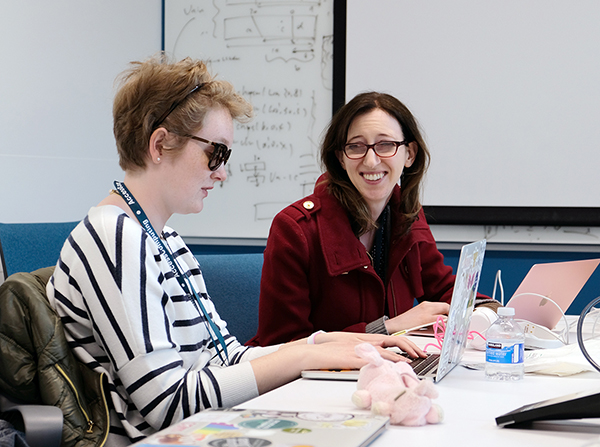
DO-IT thrives through partnerships. Partners engage with us to discover new ideas, spread our mission, recruit participants, and implement interventions that help make the world more welcoming and accessible to individuals with disabilities.
Partners participate in our programs with the following activities:
- engaging in conferences and capacity building institutes and other conferences
- participating in project training and communities of practice
- committing to making their courses, resources, programs, facilities, and/or workplaces and hiring practices more welcoming and accessible to people with disabilities
- exploring internship opportunities for students with disabilities in their fields
- gathering and sharing data used to measure changes in the engagement of people with disabilities in their programs
- reviewing resumes, sharing networking opportunities, and hiring capable students with disabilities
To learn more about becoming a partner in a DO-IT project, send an email to doit@uw.edu.
Research and Best Practices
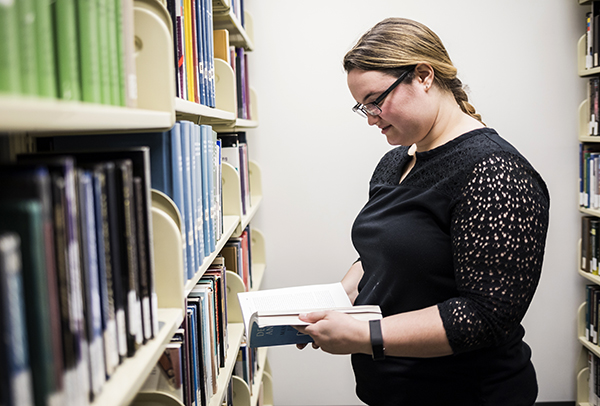
DO-IT publishes best practices and research findings in peer-reviewed and other journals. These publications allow thousands of stakeholders to learn about DO-IT’s evidence-based practice and access tools and training materials. Journals where the work of DO-IT and its partners has appeared include the following:
- Journal of Postsecondary Education and Disability
- WORK: A Journal of Prevention, Assessment, and Rehabilitation
- Information Technology and Disabilities Journal
- ACM Transactions on Computing Education
- NeuroRehabilitation
- Creative Education
- Journal of Science Education for Students with Disabilities
- Disability & Rehabilitation: Assistive Technology
- Journal of Vocational Rehabilitation
- The Review of Disability Studies
- Journal of School Public Relations
- Research in Learning Technology
- American Society for Engineering Education
- Assistive Technology Outcomes and Benefits
- Journal on Excellence in College Teaching
- Journal of Graduate Teaching Assistant Development
- Journal of Research on Technology in Education
- The Journal of Rehabilitation Administration
- National Association of Colleges and Employers Journal
- Journal of Higher Education Theory and Practice
- Open Learning: The Journal of Open, Distance and E-learning
- American Behavioral Scientist
- Currents in Teaching and Learning
30 Years of Results
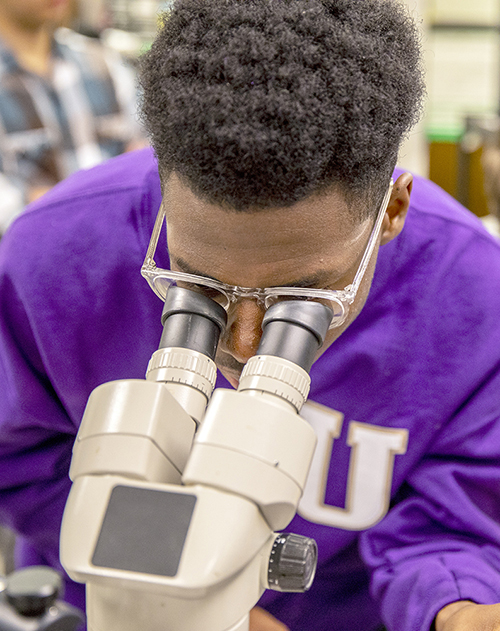
A rich body of evaluation and research data has been collected on DO-IT programs. It includes reports from participants, parents, mentors, and other stakeholders who glean the value of program interventions. Some of the results are summarized below:
- Parents of DO-IT Scholars report that DO-IT increased their children’s interest in college; awareness of career options; self-esteem; and self-advocacy, social, academic, and employment skills.
- DO-IT Scholars report that DO-IT participation helped them prepare for college and employment; develop Internet, self-advocacy, computer, social, and independent living skills; increase awareness of career options; and increase self-esteem and perseverance.
- DO-IT Scholars say that the greatest effects of the Summer Study experience are the development of social skills, followed by academic and career skills.
- DO-IT Scholars consider themselves significantly improved in academic skills, social skills, levels of preparation for college and employment, levels of awareness of career options, and personal characteristics such as perseverance and self-esteem during the course of their participation in the DO-IT Scholars program.
- DO-IT Scholars report the value of online communication for peer, near peer, and mentor support, which included being able to stay close to friends and family; to get answers to specific questions; to meet people from around the world; and to communicate with many people at one time independently and without disclosing their disabilities.
- Those who participated in work-based learning opportunities report increased motivation to work toward a career; knowledge about careers and the workplace; job-related skills; ability to work with supervisors and coworkers; and skills in self-advocating for accommodations.
- DO-IT mentors report engagement with participants around STEM, college, disability, careers, computers, assistive technology, and the Internet.
Participants in the AccessSTEM/AccessComputing/DO-IT Longitudinal Transition Study (ALTS) highly rate the value of DO-IT activities they consider most beneficial and which are most important for achieving positive postsecondary outcomes. Check out the current results of this ongoing study online.
Make a Gift

DO-IT Funders
DO-IT funding comes from the state of Washington, the National Science Foundation, the U.S. Department of Education, corporations, foundations, and people like you. Learn more about our funders.
Make a Gift
Every person deserves the chance to undertake challenging academic programs and careers. People with disabilities offer unique perspectives and abilities to any discipline. DO-IT would not be possible without generous contributions. Your support is needed to sponsor participants in the Scholars program, special events, internships, and other academic and work-based learning experiences for individuals with disabilities and stakeholders. To make a gift to DO-IT, visit our online donation portal.
A Special Thanks
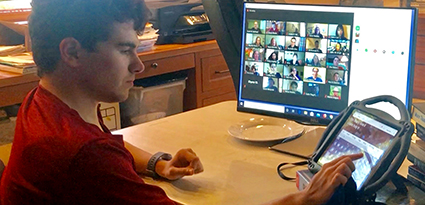
A special thanks to the state of Washington, the National Science Foundation, the U.S. Department of Education, and the foundations, corporations, and funders who have supported DO-IT’s mission over the past 30 years.
And thank you to all of DO-IT’s staff, volunteers, parents, partners, and allies for helping participants set high goals, create concrete plans, develop academic and life skills, and persist in their unique journeys in challenging academic programs and competitive careers.
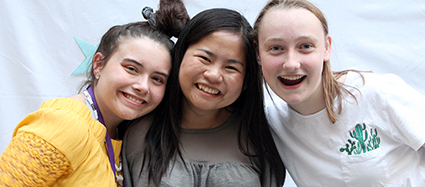
With your support, one can only imagine what DO-IT will achieve in the next 30 years.
© 2022 University of Washington